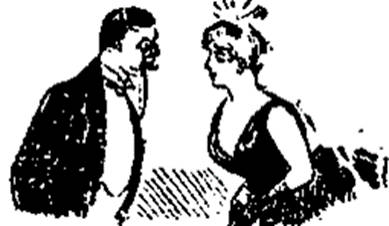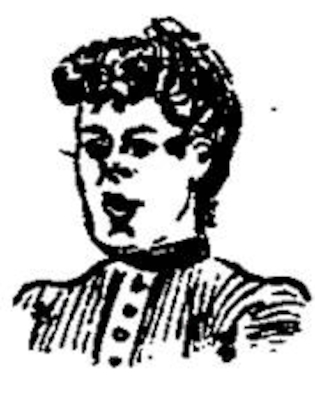This article has been transcribed from a copy of the Cardiff Times in the online collection of scanned Welsh newspapers 1804-1919 in the National Library of Wales, with grateful recognition of the free access accorded to all readers. Paragraph breaks have been introduced for easier reading.
The name 'Madame Todi (from Paris)', like that of Mr Bankhart, is an invention, indicating that purveyors of fashion 'toadied' to the wealthy. —— David Skilton

This slave’s load is nothing to that of thee man who has to keep up appearances.
HAT a mockery and a fraud this keeping up of appearances is, good sir, and what countless victims the practice has. The essential nature of keeping up appearances is fraudulent -- it is an attempt to foist oneself upon other people for what one is not instead of for what one is, to be so judged and so taken. The 'gentleman in the dock,' as the policeman often calls the criminal, is no more the utterer of a false pretence than is the man who has only £200 a year and tries to induce people to believe that he is worth £500. And what contemptible shifts and botheration people put themselves to to sustain the empty fraud. When they have guests, say, they feel throughout that they are acting a lie; they dread any contretemps which may lead to unpleasant discovery; they dread lest the rawest of the two servant girls should enter the room and say in that horribly audible and suggestive whisper to which the British domestic is so prone on such occasions, 'Please, missis, the milkman has been and says as how he can't let yer have no more milk until his bill is paid; he won't wait no longer o' master's shufflin'.' And when they receive an unexpected call about dinner time from some person whom they would willingly have propitiated, it is delightful to hear how extremely sorry they are that they have 'just dined, ' when, poor wretches, they are all the time anxiously expecting the liver and onions, the odour of which pervades the whole house.

Victims of keeping up appearances. Each thinks that the other has money – till they marry.
The man who is always endeavouring to seem richer and better in the social scale than he really is is a contemptible creature. He will sport a frock coat (rather whity about the seams) and a tall hat and a cigarette, when he would feel infinitely happier in a comfortable and cheap tweed suit and a billycock, and when a pipe would be lovingly acceptable to him. He will go to a first-rate restaurant buffet and order a sandwich and a glass of sherry as though it were only the prelude to a recherch[é] meal so soon as home should be reached. He can't see it, but he would seem a much more honest man to all who know his actual circumstances were he to patronise a modest eating house and have ninepenn'orth o’ beef, a penn’orth o' potatoes and a pint of sound ale – and I'll bet that he would feel a much better man inwardly. There are thousands of such men about; men who go to the dress circle of a theatre when they would be more comfortable and more within their means in the pit; men who smoke cigars when a common briar-root pipe would be more in consonance with all the circumstances of their lives.
With women keeping up appearance is far more prevalent than with men. Whatever their circumstances may be, they are always ambitious to seem more than they are – especially to their friends and neighbours. They are ever acting – acting in the simplest matters of life. All their allusions to their friends in the course of ordinary conversation are directed to their own aggrandisement in the minds of their friends, and they will lie, oh, how they will lie (I don't know whether they will pardon me for saying so, sir, but I speak the truth) in order to seem what they are not. They will induce their husbands to live in houses at £60 a year, while one at £20 would serve all his needs and enable them to live comfortably and without straits. It is so all through the chapter; they must travel first-class, they must always go to concerts full dress in a hired conveyance, they must patronise Madame Todi (from Paris) for their dresses (and pay about eight times what they are worth from any point of view) – and this forsooth because Mr Bankhart two doors but one off can afford to do so.

Mrs Mary Ann Scraggs tries to look like one of the gentry.
And husbands defer to their wives and are much more complaisant so far as they are concerned than they would care to think themselves – they are much more of slaves than they imagine, that is except where little pleasures, such as smoking and drinking, and playing pool [card game in which stakes are pooled] at the club, are concerned. This habit of keeping up appearances often ruins families; the husband and wife form a certain ideal of what they would appear to be to their friends, and finally they actually begin to fancy that they are what they would seem, on the same principle as in the case of that distinguished personage connected with Royalty, who had so often boasted that he had led our troops at Waterloo that he actually began to believe that he had, and was extremely wrath when anyone dared to contradict him on the point. And these same people, with this self-deception in their minds, are apt to run into debt, and to plunge headlong till the crash comes, and they are left in a hole from which they can never emerge.
Last modified 19 March 2022